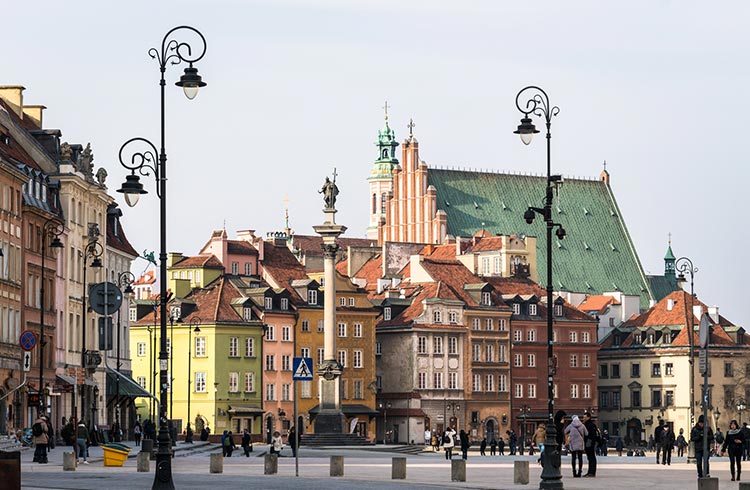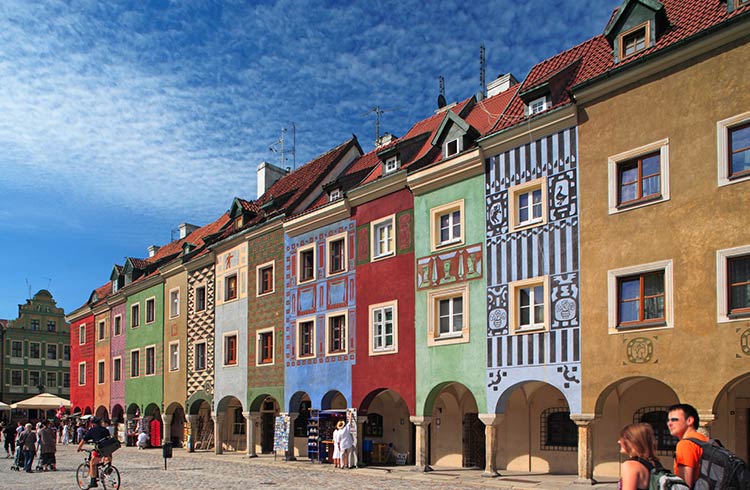6 Common Travel Scams Travelers Should Know in Poland
Watch out for fake cops, dodgy taxi drivers, pickpockets and these crafty con artists when you go to Poland.
 Photo © Getty Images/Didier Marti
Photo © Getty Images/Didier Marti
Tourism in Poland is increasing each year, and with transport improvements helping to connect locals and travelers around the country, travel within Poland is getting easier. While Poland is generally a really safe country to travel, there are a few petty (sometimes smooth) criminals operating in the country. The best way to avoid falling victim to crime is to be alert. Knowing what (or who) to avoid will also help a heap.
Here are a few examples of scams and crime you need to be aware of while exploring in Poland.
- Pickpocketing
- Credit Card Security
- Scammers Who Pose as Good Samaritans
- Taxi Driver Scams
- Fake Police
- Expensive Drinks
- Listen to The World Nomads Podcast: Poland
1. Pickpockets in Poland
This is probably the most common crime. Pickpockets often work in teams, and they usually work like this: one person creates a distraction, and the other person steals your wallet. Be aware that some crowds on buses or public transport may be artificial – especially when you are surrounded by larger men holding plastic bags in their hands.
Take care of your wallet when you are on any of Warsaw's buses and trams downtown, or on Royal Trail (Trakt Krolewski) consisting of Krakowskie Przedmiescie, Nowy Swiat and Aleje Ujazdowskie between the Old Town and Rozbrat Square near Lazienki Garden.
Be careful when you're in these Baltic resorts during summer (June to August): Sopot, Gdansk or Gdynia. These are the major pickpocketing destinations, where thieves come from other parts of Poland just to steal distracted summer vacationers' money. Pickpockets often ask a question or bump into the victim. Be aware of groups of children surrounding you, who may be begging for money or food – and never give in to their requests, this just encourages the act.
2. Credit card security
There's a growing black market for stolen credit card numbers in Krakow.
Some visitors have fallen victim to credit card scams, such as this one: after a long day of travel, the victim is awakened when the hotel room phone rings. It's the receptionist apologizing for the late hour, but asking to verify credit-card details. The victim reads them out and drifts back to sleep. It's not until much later that they realize that "front desk" was actually a front for someone else.
Most restaurants, cafes and shops now have wireless machines, so you can keep a hold of your card.
3. Good samaritan con artists
Often travelers will find if something or someone seems too good to be true, they are. Unfortunately, some "good Samaritans" are actually con artists in Poland. These people will hang around at train stations and ask if you need assistance purchasing a ticket – then they will take your money and run.
You should also be wary of people at train stations who offer to show you to your seat. When you get there, they will demand payment.
Pay attention to people helping you to find a parking spot. In many cities, like Warsaw, Gdansk or Poznan there are men waiting around to look after your car, and then demanding payment for their "services" when you return.
4. Dodgy taxi drivers
Make yourself familiar with Polish currency and the bills you're carrying and paying with.
Some taxi drivers try to cheat their foreign customers by insisting you didn't pay enough (and in the meantime, they hide the money you actually paid and show you smaller bills).
Some will charge higher night time and weekend rates on the meter during a weekday. Others might quote you one fare and charge you double once you arrive at your destination.
And watch out for the "shortcuts" which happen to be much longer than actual route. Ask at your hotel for an estimate of how long a taxi ride will take and what it should cost, and make sure the driver knows you know.
Never take unmarked taxis – those without a logo and telephone numbers – they will charge you much more than the actual rate. Official taxis will always run a meter so you know exactly what fare you will be charged.
5. Fake police in Poland
Police are there to help you. But, in some tourist destinations, there are people wearing police uniforms for totally different purposes. It's easy to be tricked when you're not familiar with the official uniform.
Unfortunately, not even tip-top uniform recognition skills will help you with one particular scam, such as this one: thieves claiming to be plain-clothed policemen come to assist you. The "policemen" then ask to see your ID and credit cards, and to be given PIN numbers. The fake police officer will then look through your wallet, giving it back to you saying everything is fine. But, he will be long gone by the time you realize some of your money is missing or credit cards are gone. No genuine law enforcement officer will ask you for your PIN.
6. Overpriced drinks
In Krakow, foreigners are sometimes saddled with outrageous bills for drinks at certain bars and clubs (particularly on ul. sw. Tomasza, ul. Slawkowska, Florianska,and sw. Marka), all occurring after they were invited to have a drink by young Polish women, who are obviously members of the scam group. Make sure you always check the prices before you order anything – including the prices of the drinks the girls are having.
If you need to call the police in an emergency, you can call the Europe-wide number 112. You may also dial 997 for police, 998 to report a fire, or 999 to summon an ambulance.
Listen to The World Nomads Podcast: Poland
Related articles
Simple and flexible travel insurance
You can buy at home or while traveling, and claim online from anywhere in the world. With 150+ adventure activities covered and 24/7 emergency assistance.
Get a quote

No Comments